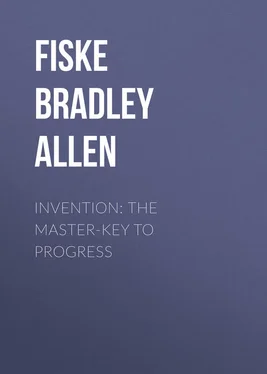Bradley Fiske - Invention - The Master-key to Progress
Здесь есть возможность читать онлайн «Bradley Fiske - Invention - The Master-key to Progress» — ознакомительный отрывок электронной книги совершенно бесплатно, а после прочтения отрывка купить полную версию. В некоторых случаях можно слушать аудио, скачать через торрент в формате fb2 и присутствует краткое содержание. Жанр: foreign_antique, foreign_prose, на английском языке. Описание произведения, (предисловие) а так же отзывы посетителей доступны на портале библиотеки ЛибКат.
- Название:Invention: The Master-key to Progress
- Автор:
- Жанр:
- Год:неизвестен
- ISBN:нет данных
- Рейтинг книги:4 / 5. Голосов: 1
-
Избранное:Добавить в избранное
- Отзывы:
-
Ваша оценка:
- 80
- 1
- 2
- 3
- 4
- 5
Invention: The Master-key to Progress: краткое содержание, описание и аннотация
Предлагаем к чтению аннотацию, описание, краткое содержание или предисловие (зависит от того, что написал сам автор книги «Invention: The Master-key to Progress»). Если вы не нашли необходимую информацию о книге — напишите в комментариях, мы постараемся отыскать её.
Invention: The Master-key to Progress — читать онлайн ознакомительный отрывок
Ниже представлен текст книги, разбитый по страницам. Система сохранения места последней прочитанной страницы, позволяет с удобством читать онлайн бесплатно книгу «Invention: The Master-key to Progress», без необходимости каждый раз заново искать на чём Вы остановились. Поставьте закладку, и сможете в любой момент перейти на страницу, на которой закончили чтение.
Интервал:
Закладка:
In Egypt, the writing was done on sheets of papyrus, made from a reed that grew in the marshes. To devise and make both the baked clay tablets and the papyrus, it is clear that invention had to be employed; for nothing exactly like them existed in nature. Thus the invention of the art of writing was supplemented by the invention of the art of preserving the records that writing made. The act of writing would have been useful, even if no means had been invented for preserving the things written; even if the things written had perished in a day. But the importance of the invention of writing was increased ten thousand fold by the invention of the means for preserving the things written; because without that means it would have been impossible by any process of continual copying of tablets to keep at hand for reference that library of records of the past on which all progress has been based, and from which every act of progress has started, since some inventor of Babylonia invented baked clay tablets and some inventor of Egypt invented papyrus.
It may be objected that there is no reason for assuming that any one man invented either; that each invention may have been the joint work of two men, or of several men. This of course, is true; but it does not minimize the importance of either invention, or the credit due to the inventors. It simply divides the credit of each invention among several men, instead of giving it all to one. It is a notable fact, however, that, although some inventions have been made by the joint work of two men, and although some books have been written, and some music has been composed by two men working in cooperation, yet such instances have been rare.
Many men combine to do constructive work of many kinds, and millions combine to work and fight together in armies; and it is an interesting fact that the working together of many men has been made possible by inventions, such as writing and printing. Yet there is hardly any other kind of work that is so wholly a "one man job" as inventing. The fact that only one man, as a rule, makes a certain invention, or writes a certain book, or composes a certain musical piece, or does any other inventional work, seems to spring naturally from the original fact that an invention begins with a picture made by imagination on a mind. Now a picture so made is an individual picture in an individual mind. If the picture is allowed to fade, or if from any cause the mind that received it does not form it into a definite entity, no invention is made. If, on the contrary, the mind develops the dim picture into a definite entity of some kind, that mind alone has made that invention; even if other minds improve it later by super-posing other inventions on it.
It is true that sometimes a man who receives from his imagination a mental picture of some possible invention will communicate it to another man, and that other man will contribute some constructive work, and make the dim picture into a reality; so that the complete invention resulting will be the joint product of two men. It seems to be a fact, however, that these dim pictures have rarely been disclosed while in the formless period, and that almost every invention of which we know the history, was made by one man only.
It need hardly be interjected here that we are discussing inventions only, and not the acts of making inventions practicable in the sense of making them useful or commercially successful. At the present day, there are few inventions indeed, which even after having been completed as inventions, need no modification at the hands of the engineer and the manufacturer, before they are suitable to be put to practical use.
That the Babylonians realized the importance of their invention is proved by the fact that their baked tablets were carefully preserved, and that in some cities large libraries were built in which they were kept, as books are kept in our libraries at the present day. When the expedition of the University of Pennsylvania made its excavations near the site of the ancient city of Nippur, in the southern part of Babylonia near the city of Babylon, a library was discovered that contained more than thirty thousand tablets.
The writing of the Babylonians, while phonetic, was a development of picture writing, each character expressing a syllable, and was made of wedge-shaped characters. From the shape of the characters the adjective cuneiform has been applied to the writing, the word coming from the Latin word, cuneus , a wedge. Syllabic writing was in use for probably three thousand years among the peoples of western Asia.
The Babylonians utilized their ingenuity and inventiveness in divers ways, and accomplished many things that help to form the basis of our civilization, without which we cannot imagine it to exist. Their creations were of a highly practical and useful kind, and illustrate the proverb that "necessity is the mother of invention." From the fact that their ships sailed the waters of the Persian Gulf, and had need of means to locate their positions and determine their courses from port to port, and from the fact easily noted by their navigators that the heavenly bodies held positions in the firmament depending on their direction from an observer, and on the month and season and the time of day, the study of the heavens was undertaken; with the result that the science of astronomy was conceived and brought into existence.
It may here be asked if this achievement can properly be called an invention. One must hesitate a little before answering this question either negatively or positively; because such an achievement is not usually called an invention, and yet it cannot truthfully be denied that there is nothing in Nature like the science of astronomy, and that therefore it must have been created by man. It cannot reasonably be denied, also, that after the science had at last been formulated, it was as clearly a distinct entity as a bow and arrow or a telephone. Furthermore, it does not seem unreasonable to suppose that, before any of the principles of astronomy were laid down, before anyone even attempted to lay them down, before anyone even attempted to ascertain the laws that seemed to govern the movements of the heavenly bodies, the idea must have occurred to someone that those heavenly bodies were all moving in obedience to some law; and a more or less confused and yet real image must have been made upon his mind of a great celestial machine. He must actually have imagined such a machine. This first act would be quite like that of the inventor of a mechanical device. The next act would be to observe and record all the phenomena observable in connection with the movements of the celestial bodies, then to analyze and classify them. This series of acts would not, of course, be inventive or even constructive. They would rather be like those studies of any art, without which no man could be an inventor in that art.
The analysis having been completed, the positions of the heavenly bodies at various times having been ascertained and tabulated, the next step would seem to be to construct a supposititious machine of which each part would represent a heavenly body, and in which those various parts would move according to laws induced tentatively from the actual motions of certain heavenly bodies. If it were afterwards found that all positions of each part, predicted in advance by applying the laws tentatively induced, corresponded to the actual positions of the heavenly body that it represented, then the supposititious machine could be truthfully declared to be a correct imitation of the great celestial machine. That is, the machine could be declared to be successful.
The science of astronomy is, in effect, such a machine. Its parts are representations of the sun, moon and other heavenly bodies, that move according to laws that are illustrated in the diagrams, and expressed precisely in the formulas.
Читать дальшеИнтервал:
Закладка:
Похожие книги на «Invention: The Master-key to Progress»
Представляем Вашему вниманию похожие книги на «Invention: The Master-key to Progress» списком для выбора. Мы отобрали схожую по названию и смыслу литературу в надежде предоставить читателям больше вариантов отыскать новые, интересные, ещё непрочитанные произведения.
Обсуждение, отзывы о книге «Invention: The Master-key to Progress» и просто собственные мнения читателей. Оставьте ваши комментарии, напишите, что Вы думаете о произведении, его смысле или главных героях. Укажите что конкретно понравилось, а что нет, и почему Вы так считаете.












